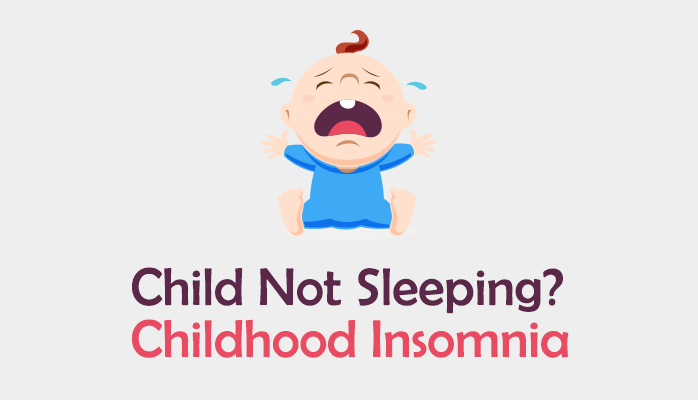What Is Childhood Insomnia
It's not something most people would think of when their child - toddler, adolescent, teenager - is acting out, but childhood insomnia is very real. The effects of sleep deprivation are very real too.
Childhood insomnia is the same as it is in adults:
- Can't fall asleep
- Can't stay asleep during the night
- Become wide awake very early in the morning
Unfortunately identifying childhood insomnia is made difficult because symptoms largely overlap with seemingly normal child and teen behavioral changes:
- Moodiness
- Acting out
- Being tired all the time (we might ask ourselves, "Is it just a growth spurt?")
- Difficulty concentrating
The difference between childhood insomnia causing such problems and normal childhood development is that one is normal, and one is likely preventable.
Causes of Childhood Insomnia in Younger Children
Causes for childhood insomnia in young children an adolescents tend to differ from teenagers. For one, younger children tend to have much less free access to distractions such as TV, smart phones, social media, and so on. Also, they lack the extreme and total changes to living and being that are a natural result of puberty.
Often, causes of childhood insomnia in younger children are environmental:
- Lack structures bedtime routine
- Lack requisite sleeping space that is quiet, distraction free, and dark
- Lack a specific bet time
- Don't have ideal pre-sleep habits, such as no food, limited drink, "quiet time", and so on
For parents who have tired everything to get their child comfortable and ready for bed but it still is a struggle to get/stay asleep, there may be other factors at work:
- Stress in life (i.e., divorce)
- Stress at school
- Rapid physical changes, such as growth spurts
- Restless leg syndrome
- Parasomnias, such as sleep walking or chronic night terrors
- Side effects of certain medications - and we are mostly talking about some ADHD medications
- Obstructive sleep apnea
Trying to observe your child during their sleep may help you narrow down how and when such symptoms are expressed.
Causes of Childhood Insomnia in Older Children (Teenagers)
Puberty has the unique side effect of making a child/young adult feel about as close to an alien as is possible. Puberty taxes an enormous toll on our children, including many of the following:
- Extreme hormonal changes
- Developing sexual awareness
- Personal identity awareness and development (a nice way of saying "identity crisis")
- Extreme physical changes
- Extreme psychological and emotional (again, hormones) changes
- Rapid change in importance and awareness of peer acceptance
- Large rise in stress to perform in academics and sports (i.e., high school)
- Depression
- Onset of certain disorders, such as autoimmune diseases
- Distractions! social media, TV, phones, internet, laptops, etc.
Speaking form personal experience, I struggled greatly with insomnia in early high school for many of the reasons listed above. Especially for children in competitive academic and athletic environments, the stress and anxiety of these pursuits can, when paired with puberty, be extremely stressful on some children and their sleep will suffer as a direct consequence.
As parents, this can be frustrating because: we want our children to be happy, we want our children to succeed, and it's hard to know how to help sometimes.
Symptoms and Consequences of Childhood Insomnia
Regardless of age - whether child or adult - symptoms of insomnia tend to be fairly similar, though we may use different synonyms for childhood symptoms:
- Moodiness
- "Acting out"
- Hyperactivity
- Sudden onset of lethargy and exhaustion during the day
- Chronic fatigue
- Difficulty concentrating
- Memory problems
- Aggression
- Rapid emotional changes
The consequences of such problems are not hard to imagine. In short:
- Decreased academic performance
- Decreased athletic and extracurricular performance
- Lower quality of life
As said, the important point to keep in mind with these symptoms is context: are the symptoms causes by sleep deprivation or are they due to normal childhood development.
Treatments for Childhood Insomnia
Treatments for childhood insomnia will vary a lot depending on the age of the child and the causes for their symptoms. We can break down these treatments into several categories:
- Insomnia as a result of normal development
- Insomnia as a result of personal stressors
- Insomnia as a result of external factors
Therapy can often be an effective treatment for children of any age whose insomnia is caused by personal stressors or normal development.
Being staunch about bedtime routines, bedtimes, the sleeping environment, and personal habits before bed for children of any age is also an effectively used method of limiting external factors that cause insomnia. This includes making sure rooms are dark and quiet, baths before bed, essential oils, no food before bed, and a consistent routine in the hour before bedtime. With younger children, you have direct control over such things. With teenagers, you have less direct control but largely have much say and influence over promoting healthy bedtime factors.
Consulting with your pediatrician about potential medical reasons for the insomnia, such as obstructive sleep apnea in your child, medications causing problems, or medical related side effects of getting older (hormones, growth spurt pains, etc.)
Finally, sometimes simply talking to your child and communicating a sense of flexibility in expectations about academic and extracurricular performance can be a big stress relief for children - frankly speaking, whether they show it or not children tend to be "parent-pleasers".
If you live in Alaska and are concerned that your child is dealing with problems related to sleep deprivation and childhood insomnia, our sleep specialist can provide insight. Contact us:


